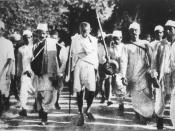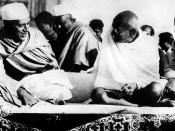A philosopher is a person who "lives a life of reason and equanimity" (Miller). Philosophers have played an important role in society beginning in the early centuries of BCE. Theories of significant philosophers can help to change the fates of thousands of people and generate a change in the future. Gandhi lived through the time of the Civil Rights movement in India and he not only contributed to this progress and believed in its cause, but eventually led it. An accomplished Hindu follower and lawyer, Gandhi would leave his mark on the world and lives of many others through his revolutionary non-violence philosophies. Mohandas Gandhi was an influential thinker whose philosophies, created over fifty years ago, proved to change the world. His concept of civil disobedience brought an end to seemingly endless wars and discrimination and also impacted future works of literature such as "Letter from a Birmingham Jail" by Martin Luther King Jr.
and "The Revolt of Mother" by Mary E. Wilkins.
Gandhi's life and home influenced his ethics, which helped him discover the truth and tranquility of non-violence. Mohandas K. Gandhi was born October 2, 1869 in Porbandar, India (Wikipedia). Porbandar is a small city in western India and is located on the coast and it was an ancient sea-port. His parents were named Karamchand Gandhi and Putlibai and his father, Karamchand, was the Prime Minister of Porbandar (Lewis 714). His mother, Putlibai, was a very religious woman, strictly following the tenets of Hinduism; she was often sought out by the townspeople for advice (Shanker 5). Mohandas was the youngest of six children in his family and at an early age, Gandhi demonstrated non-violence, even after constant taunting and teasing. After Gandhi's brother hit him once, his mother once asked him, "Why didn't you hit him?" to which...


